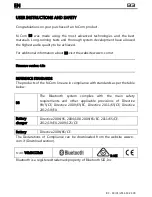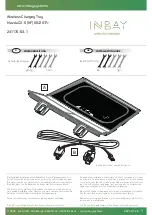
(C) Tire Identification Number (TIN)
:
The Tire
Identification Number (TIN). The TIN shows the
manufacturer and plant code, tire size, and date the
tire was manufactured. The TIN is molded onto both
sides of the tire, although only one side may have
the date of manufacture.
(D) Maximum Cold Inflation Load Limit
:
Maximum load that can be carried and the
maximum pressure needed to support that load.
See Inflation - Tire Pressure on page 5-57
and Loading the Vehicle on page 4-19.
(E) Tire Inflation
:
The temporary use tire or
compact spare tire should be inflated to 60 psi
(420 kPa). For more information on tire pressure
and inflation see Inflation - Tire Pressure on
page 5-57 and Spare Tire on page 5-85.
(F) Tire Size
:
A combination of letters and
numbers define a tire’s width, height, aspect
ratio, construction type and service description.
The letter T as the first character in the tire size
means the tire is for temporary use only.
(G) TPC Spec (Tire Performance Criteria
Specification)
:
Original equipment tires designed
to GM’s specific tire performance criteria have a
TPC specification code molded onto the sidewall.
GM’s TPC specifications meet or exceed all federal
safety guidelines.
(A) Tire Size
:
The tire size code is a combination
of letters and numbers used to define a particular
tire’s width, height, aspect ratio, construction
type and service description. See the “Tire Size”
illustration later in this section for more detail.
Light Truck Tire Example
5-51
Summary of Contents for 2009 DTS
Page 18: ...Put someone on it Get it up to speed Then stop the vehicle The rider does not stop 1 14...
Page 76: ...NOTES 1 72...
Page 143: ...NOTES 3 3...
Page 144: ...Instrument Panel Overview Console Shift Model shown Column Shift Model similar 3 4...
Page 270: ...NOTES 3 130...
Page 408: ...NOTES 5 104...
Page 422: ...Engine Drive Belt Routing 4 6L V8 Engines 6 14...
Page 446: ...NOTES 7 20...
















































